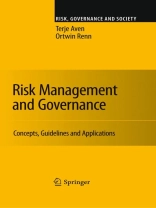Risk is a popular topic in many sciences – in natural, medical, statistical, engineering, social, economic and legal disciplines. Yet, no single discipline can grasp the full meaning of risk. Investigating risk requires a multidisciplinary approach. The authors, coming from two very different disciplinary traditions, meet this challenge by building bridges between the engineering, the statistical and the social science perspectives. The book provides a comprehensive, accessible and concise guide to risk assessment, management and governance. A basic pillar for the book is the risk governance framework proposed by the International Risk Governance Council (IRGC). This framework offers a comprehensive means of integrating risk identification, assessment, management and communication. The authors develop and explain new insights and add substance to the various elements of the framework. The theoretical analysis is illustrated by several examples from different areas of applications.
Mục lục
Introduction: Concept of Risk.- Characteristics of Risks in the Modern World.- Risk Perspectives.- Risk Governance: An Overview.- Pre-assessment and Framing of Risk.- Risk Appraisal.- Risk Characterization and Evaluation.- Risk Management.- Risk Communication.- Stakeholder and Public Involvement.- Case Study 1: Risk Governance of Nanotechnology.- Case Study 2: Cash Depot and Third Party Risk.- Case Study 3: Year-Round Petroleum Activities in the Barents Sea.- Conclusions.












